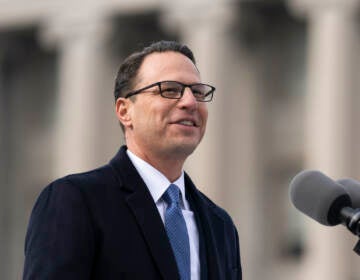If not taxpayers, who should pay for sexual harassment claims?
Pennsylvania has spent at least $1.5 million to settle sexual harassment cases over the last eight years.

Shown is the Pennsylvania Capitol building in Harrisburg, Monday, July 10, 2017. (Matt Rourke/AP Photo)
As new details emerge on at least $1.5 million Pennsylvania has spent to settle sexual harassment cases over the last eight years, calls are increasing for the state to change its policies.
But a number of lawmakers are struggling to find solutions that will work for every situation.
The latest report — from the Associated Press — concerns a $900,000 sexual harassment settlement the state paid in a 2016 case that involved a Department of Revenue administrator.
Other recent stories have revealed similar settlements involving elected officials.
Even though all the cases involve shades of harassment, it can be very different to settle one with a lawmaker than with a regular state or legislative employee.
Representative Leanne Krueger-Braneky is seeing that firsthand.
The Delaware County Democrat is one of a number of female legislators working on a plan that would, among other things, keep taxpayer money from funding sexual harassment settlements in the legislature.
If the harasser is a lawmaker, she said she leans toward making them pay to compensate the victim on their own.
“I believe that, first of all, we need a separate office of compliance [in the legislature] that has the responsibility to investigate any complaints of sexual harassment,” she said. “If the office of compliance finds that harassment has happened, the member of the legislature should be responsible for that payment.”
But the bill would also encompass non-elected legislative staffers. And Kruger-Braneky said that the perpetrator-pays-the-victim model wouldn’t necessarily work in those cases.
“If the supervisor, let’s say, who was the perpetrator, can’t afford to pay the settlement, does that mean the victim shouldn’t be compensated?” she asked. “That is the challenge that we’re grappling with right now.”
There’s also the matter of who is legally accountable in harassment cases.
“The challenge that we’re finding is that when harassment is alleged, the employer is responsible,” Kruger-Braneky said. “The payout is coming from the employer — that’s actually how the law has been written.”
Krueger-Braneky said it’s especially difficult to come up with solutions because the state’s settlement policies vary widely and aren’t very transparent.
A spokesman for Governor Tom Wolf’s said most settlements up to $250,000 are paid from the state’s self-insurance fund — officially known as the Bureau of Risk and Insurance Management.
Above that, he said they come from other sources, but didn’t specify which ones.
The spokesman said the Wolf administration is in the process of reviewing the state harassment policy.
The last time the main policy was updated was 2002, though Wolf did issue a related workplace discrimination order two years ago.
WHYY is your source for fact-based, in-depth journalism and information. As a nonprofit organization, we rely on financial support from readers like you. Please give today.





